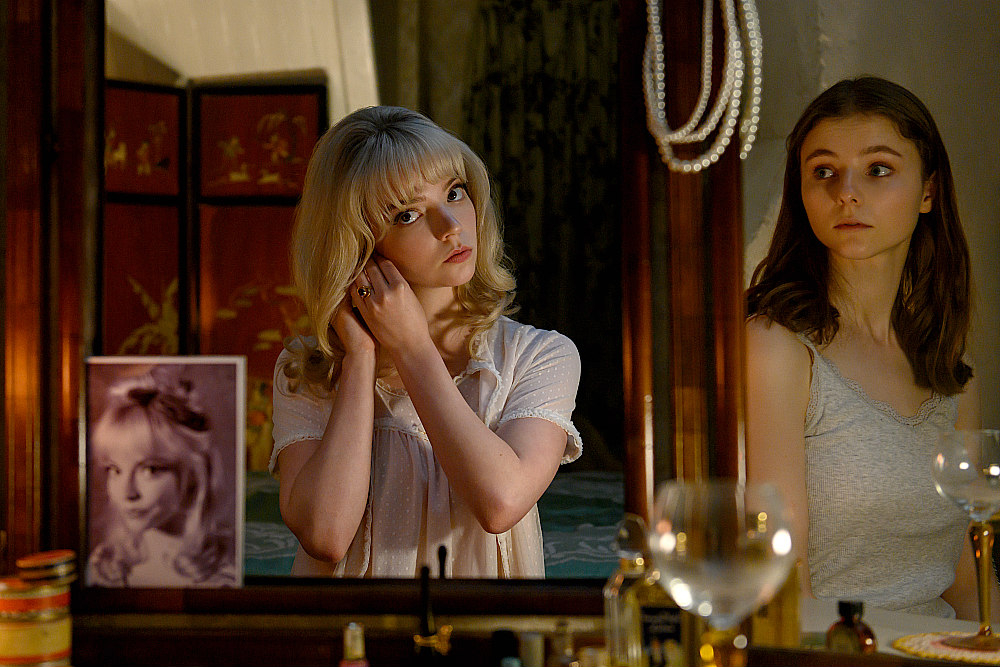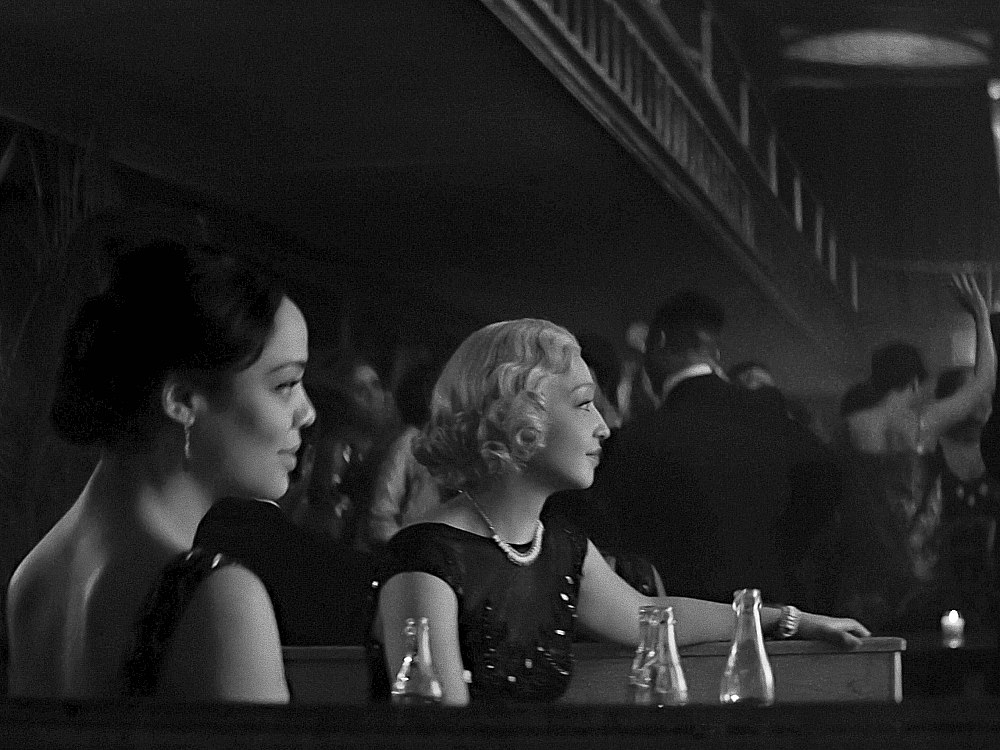Two worthy projects got the green light this week. Denis Villeneuve will be able to make his second Dune movie. The reviews were mixed, but the audience came out. And HBO has renewed its hit series Succession for a fourth season. Its third is putting out one new episode a week right now and is a must-see, I'd say.
Brian Cox stars as the boss of a media company and a dysfunctional family that has been compared to both the Murdochs and the Trumps. But don't just jump in. You need the background, the brilliant writing, and the character-building that's come before. All the episodes are streaming on CRAVE.
And new movies? There are so many this week I can't cover them all. Not Snakehead, Mouthful of Air, or even The Magnitude of all Things. It's at the Vancity Theatre and I did praise it before.
I do have these ...
Last Night in Soho: 3½ stars
Labyrinth of Cinema: 4½
Luzzu: 4
Portraits from a Fire: 3
The Capote Tapes: 4
Passing: 3½
Army of Thieves: 3
Antlers: 2
LAST NIGHT IN SOHO: If you remember the Swinging ’60s and the Carnaby Street style of the British Invasion, you'll enjoy this frolic that takes you back to those times. But you might come out of it just a bit perplexed. What exactly is it reliving? What does it amount to? There's so much fantasy in this film by Edgar Wright you'll probably find yourself pondering those questions.

It starts as a typical "small-town girl moves to the big city" story. Eloise (Thomasin McKenzie) comes to London from Cornwall to learn fashion design. She starts to imagine herself as the glamorous and playful blond Sandie (Anya Taylor-Joy), but is she real or just an image in the mirror? She seems to evolve and be both. She draws Eloise to parties and to those gentlemen's strip clubs we used to read about. Sandie aspires to be the next Cilla Black. Eloise auditions by singing Downtown and then asks an admirer (Matt Smith, a former Doctor Who) to be her manager. He turns out to be not at all benevolent. The men in the strip club try to come on to her, and at home in her flat, she may have witnessed a murder. What the heck is going on? Two timelines are in play. Characters may be imaginary. It ends in a swirl of impressions and an explanation, of sorts, by the landlady (Diana Rigg, in her last role). Two other old hands, Rita Tushingham and Terrence Stamp, also have key roles and add to the retro fun. It is that, even if it is elusive. (International Village, Marine Gateway, and suburban theatres.) 3½ out of 5
LABYRINTH OF CINEMA: The late Japanese director Nobuhiko Obayashi dealt more than once with his country's wartime history. He outdid himself with his final film, a three-hour extravaganza and imaginary outburst. The setting is a movie theatre on its last evening as a group of friends attend and drift in and out of the film they're watching. Sometimes they're commenting from their seats. Sometimes they're in what they're watching, getting into Yakuza fights, ninja battles, or even training for a contemporary army and finding themselves sent to war in Manchuria and elsewhere. Movies are a time machine for them.

Sometimes they're part of a chorus line on stage or on a bus headed to a show. There's too much here to explain even part of it, but ultimately, it's a denunciation of war itself (“There's no reason to kill each other, but that's war.”) and war (or barbarization) as a byproduct of modernization. Ideas like that are tossed around playfully and with great visual imagination. Leaders are denounced for deceiving the people, a charge made tragic by a bus ride to Hiroshima. Surprisingly, the film finds a note of optimism by the end. (Vancity Theatre. Also The Rio, Nov.7) 4½ out of 5
LUZZU: Here's a nice surprise, a very involving film from a place and circumstance you might not expect. Jesmark is a fisherman in Malta played by an actual fisher named Jesmark Scicluna and doing a better job as an actor than most. You believe him completely as life throws one setback after another at him. His child needs expensive medical treatment. His boat needs repairs. The fish aren't biting and regulations imposed by officials outlaw some easy-money alternatives. “We need help,” he says. All he's offered is a buyout financed by the European Union. He doesn't want to give up the trade he, his father, grandfather, and great-grandfather all worked at.

That theme of tradition taken away is very strong. It shows up in loud arguments at the fish auction. In sneaky manoeuvrings by buyers and in the rule-breaking he witnesses all around him. Even the giant container ships out on the water. His self-respect is at stake. He won't take a job on a trawler because he says they destroy the seabed. But will he take the black market work he's offered? The film tells the story at a lively pace, with colourful scenes and a strong neo-realist feel directed by Alex Camilleri. The title is local jargon for a brightly-painted boat. (Vancity Theatre.) 4 out of 5
PORTRAITS FROM A FIRE: Here's another fine example of the work we've been getting from Indigenous filmmakers this year. It's been honoured at festivals. Trevor Mack, the director and co-writer, got the Emerging Filmmaker Award at Vancouver's this year. It's set in the Chilcotin territory and tells a factional story about uncovering uncomfortable secrets. There is quite a bit of magic realism in it.

William Lulua stars as Tyler, a youth making amateur films on the reserve and trying to get an audience to come and watch them. His dad (Nathaniel Arcand) is distant, his grandfather is close and makes jokes about westerns and wishing to shoot white men. A stranger named Aaron (Asivak Koostachin) appears and tells him to drop the space opera stories and confront the truth in his films. For instance, that house fire after which his mother disappeared. Dad won't talk about it. Tyler worries he may have caused it. The film keeps us in tow as it uncovers what really happened. Along the way, it offers this statement: “It's gonna keep going for generations until somebody does something about it.” That's relevant, even beyond the film. (Landmark Theatres, New West, and others on Tuesday and on VOD starting the week after.) 3 out of 5
THE CAPOTE TAPES: Truman Capote — bon vivant, gay, raconteur, and author of Breakfast at Tiffany's and In Cold Blood — gets an intriguing and intimate appreciation in this film. Stars, writers, his lover, his adopted daughter, and many others talk about him, in old clips or in new interviews. Lauren Bacall: “intelligent.” Norman Mailer: “a special life.” George Plimpton: “naughty tarantula.” And on and on from Dick Cavett, William Buckley Jr., and of course, Capote himself. He's heard on tapes recorded before he died, which director Ebs Burnough assembled trying to explore a mystery in his life. What happened to a long-rumoured novel he was writing called Answered Prayers?

A couple of chapters were printed in a magazine; the rest disappeared. Possibly because he was revealing “unspeakably private” secrets about New York cafe society types, and they were starting to turn against him. The documentary is full of drama like that as it recounts his life from the beautiful gay boy from the South to the darling of New York society. He led an “ebullient life,” danced at Studio 54, got into cocaine, and hosted the most important party of the decade. He was also cruel and driven by a need to be loved. Fascinating stuff. (Now available VOD and digitally.) 4 out of 5
PASSING: A 100-year-old novel yields a timely, modern statement about race relations. Rather politely, though, and that makes it feel like a bit of an antique in these noisier times. Rebecca Hall, the English actor, adapted Nella Larson's book and directed the film in crisp black and white, with style and grace. The issues are there, but feel like they're discussed over an afternoon tea, not a soapbox.

Tessa Thompson and Ruth Negga are old friends who haven't seen each other for 12 years and catch up when they meet by chance. They're both light-skinned women of colour. Reenie (Thompson) lives in Harlem, is married to a Black doctor, and volunteers for a charity group. Clare (Negga) is passing for white, has married a white man (Alexander Skarsgård), and secretly dislikes her “pale life.” That theme of racial pride drives the story. Clare is envious of her friend for her life, which she imagines is “free, good, and safe.” She herself is living a lie. Her husband is a racist. She enthusiastically comes along with Reenie to a couple of dance parties where she can be who she really is. The fun won't last, but the film makes valid statements about how we deal with race. (Vancity Theatre now, Netflix soon.). 3½ out of 5
ARMY OF THIEVES: In case you were asking how it came about that safecrackers carried out a heist during a zombie outbreak in Zack Snyder's movie Army of the Dead, here's the answer. This film shows the lead-up to it as lived by one of the perpetrators. He's Dieter, played again (but also directed this time) by Matthias Schweighöfer, one of Germany's busiest young actors. He's a modest bank teller with special knowledge of bank vaults, notably, the work of one designer who created four he named after Wagner's Ring Cycle. A gang wants to rob them and Dieter is recruited by the jewel thief in the group (Nathalie Emmanuel, seen in Game of Thrones and the Fast and Furious movies) to crack them. Her pitch is “a life less ordinary.” Also, some acrimony for the banking system.

The gang gets to three of those vaults, in Paris, Prague, and St. Moritz. There's intricate preparation leading to good suspense each time and a speedy and agile tone created by the international cast. Zombies are mentioned, it's a prequel after all, but they're only in the background, in TV news reports from Las Vegas. It's a hint of what's to come, in the movie we saw a few months ago. (Netflix.) 3 out of 5
ANTLERS: There's too much going on in this mild horror film. You've got environmental fears in a rundown Oregon town (played by Hope, B.C.), warnings from Indigenous people of a “malevolent spirit” awakened by the “pillaging” of resources, and a possible sign of child abuse recognized by a teacher in one of her students and shared because of memories from her own early life. These strands and more are focused in an attic closed off with double locks in a shabby house. What's up there? Is it a Windigo, that mythological Indigenous creature? Is it related to the scary noises and scenes we saw deep in a mine at the start? The film explains, but never properly connects all this. And for a horror film, rarely scares.
Keri Russell plays the teacher and Jesse Plemons her brother, the sheriff. They had an abusive father and still feel the trauma. Jeremy T. Thomas plays a young student who draws sketches that alarm the teacher and prompt her to investigate his home life. We've been getting hints of horrors there and gradually learn more. Problem is, the presentation is laughable at times and the film is dull. The performance by Thomas is very good, though, and there's solid work from Graham Greene and Jay Brazeau, two of the Canadian actors in the cast. (International Village, Marine Gateway, and suburban theatres.) 2 out of 5





Comments